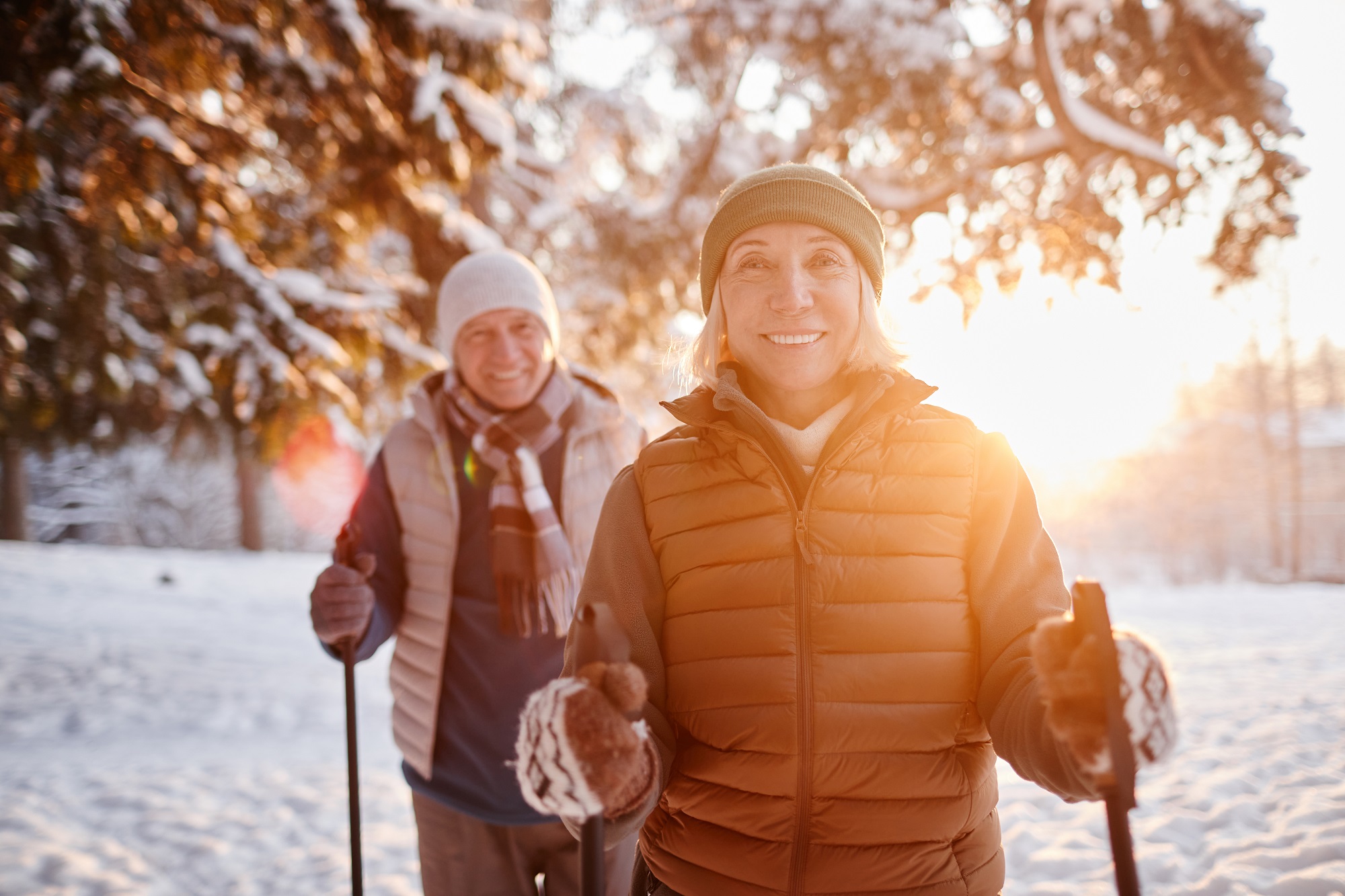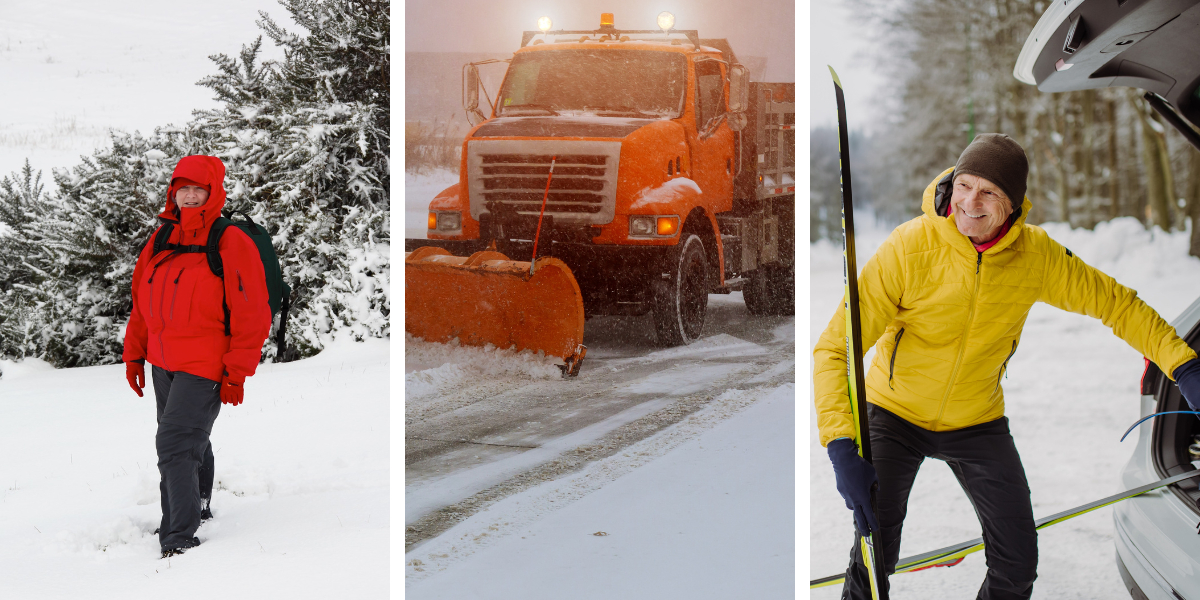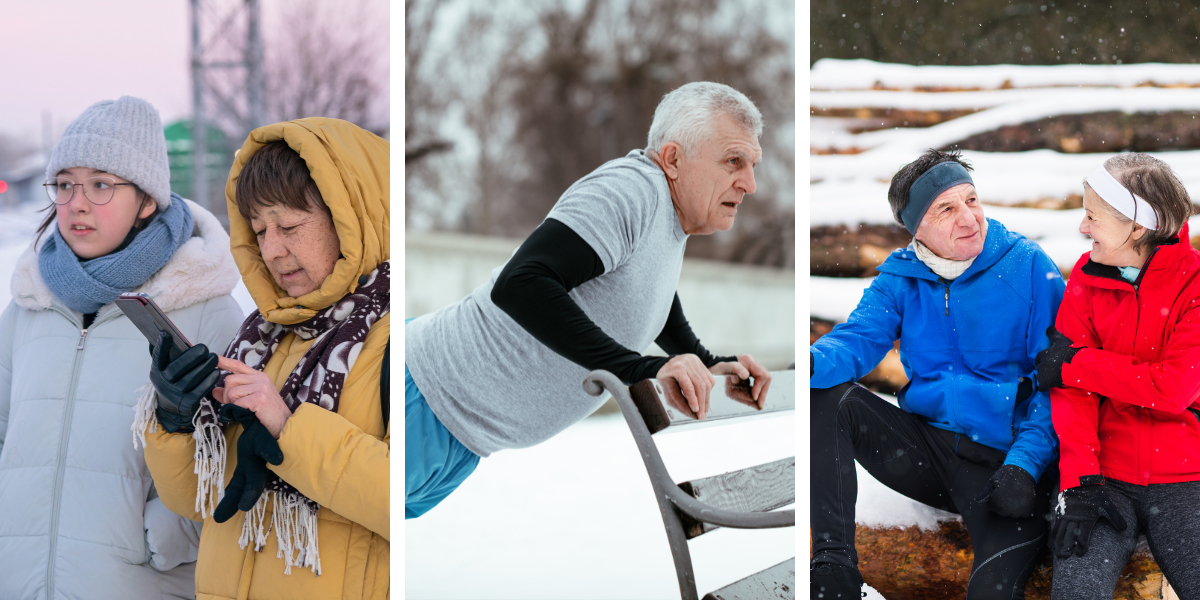
Exercising in Cold Weather for Seniors
December 23, 2022Last month, we spoke about the benefits of getting outside in the winter for seniors. If you’ve been reaping these benefits and are considering incorporating outdoor exercise into your regimen that is fantastic. That being said, there are certain things you should take note of when considering exercising in cold weather for seniors.
Before going for a run or hike in cold temperatures , make sure you take the proper precautions so you stay safe.
Preparing for outdoor exercise
Exercising outdoors during the winter months usually requires more than a heavy jacket. There are certain conditions you need to be mindful of before you leave the house, as well as things to remember while you are outdoors.
Before heading outside…
- Take heed of the weather forecasts. Extreme cold, rain, snow, or ice is nothing to be trifled with. If any of these weather conditions are expected, exercise indoors. Some sources say to skip outdoor exercise when the temperature falls eighteen degrees below zero, but the cutoff for seniors should be much warmer. The cold impacts older adults more severely and can cause heart and breathing problems. According to Harvard Health, seniors should avoid outdoor exercise much below 32 degrees.
- Exercise in the warmest part of the day. This comes at the exact opposite recommendation of summer exercise, but exercising when the sun is at its peak during the winter is crucial for keeping you warm. During this time of year, the warmest point of the day is at about noon.
- Protect your skin and eyes. The sun may not be as intense this time of year, but it can still do damage. You can even be sunburned by the sun reflecting off the snow! Don’t forget to use sunscreen on whatever skin is exposed when you go out. The rest of your skin should be protected by plenty warm layers of clothing.
While exercising outdoors…
- Warm-up. Cold weather naturally tightens your joints and muscles, so it’s important you do a proper warm-up before going out. Great examples of this is stretching, simple bodyweight exercises, and walking.
- Stay hydrated. While you’re less likely to feel thirsty in the cold, it is crucial you stay hydrated. Dehydration makes it harder to maintain your internal temperature, which is dangerous in the cold. If you don’t want to carry a water bottle, you should drink a glass of water before you leave and a glass when you get home.
- Tell a friend. It’s important someone knows how long you plan on being outside in the cold weather. If something goes wrong and they don’t hear from you when they should, they’ll know to come look for you. If possible, it’s even better to bring a friend or loved one with you.
Risks to be aware of when exercising in cold weather
While getting outside in the winter is great for your overall mental health, certain individuals should not exercise outdoors due to health concerns. It’s important you discuss these concerns with your doctor before heading outside to ensure you stay as safe as possible.
Certain risks of outdoor exercise include…
- Heart strain. As temperatures drop, blood vessels narrow, which makes it harder for the heart to pump blood through the body. If you already have a serious heart condition, you could experience heart strain or even heart attacks.
- Hypothermia. In this condition, your body loses heat faster than you can produce it, which can impact your heart, kidney, or liver with serious consequences. This is why wearing proper layers of clothing when leaving the home is so crucial.
- Frostbite. Frostbite is more than feeling cold. This condition causes lasting damage to your exposed skin. It should be treated as soon as possible for the health of your body. The best way to avoid frostbite is, again, to dress properly and keep skin covered.
- Muscle injury/strain. Due to narrowed blood vessels, your muscles will be stiffer. It is important you warm up to avoid serious strain or injury.
- Falls. This risk is likely the one you are most aware of. The icy ground leads to an increased risk of falling, which can cause broken bones.
Don’t push yourself too hard as you attempt to exercise outdoors. If you feel unsafe, listen to your gut and head back indoors. Remember: even simple walks are great exercise.
At-home caregivers can help you lead a healthy lifestyle this winter
Healthy meals are just as important as exercise. An at-home caregiver can help you stay healthy all year round by preparing meals that are as delicious as they are good for you.
In addition to meal preparation, at-home caregivers can assist with medication reminders, light housekeeping, errands, personal care, and companionship. To learn more about whether or not an at-home caregiver is right for you, call us at 773-274-9262.
Articles:
-
How to Use FaceTime: a Senior’s Guide
March 20th, 2024 -
The Best Organic Cleaning Products for Caregivers
March 19th, 2024 -
Celebrating St. Patrick’s Day with Seniors
March 14th, 2024 -
Intellectual Activities for Seniors to Keep their Brains Stimulated
March 13th, 2024 -
Tips for Communicating with Seniors with Hearing Loss
March 12th, 2024 -
How to Learn a New Language as an Older Adult
March 7th, 2024 -
Foods that Support Bone Health in Seniors
March 6th, 2024 -
A Note to Our Staff for Caregiver Appreciation Day
March 1st, 2024 -
The Importance of a Senior/Caregiver Bond
February 21st, 2024 -
Recreational Sports as Fitness for Seniors
February 27th, 2024 -
Exploring the Wonders of Reminiscence Therapy
February 15th, 2024 -
Staying Educated on Alzheimer’s Disease and Dementia Care
February 14th, 2024
Call Now! 773.274.9262






